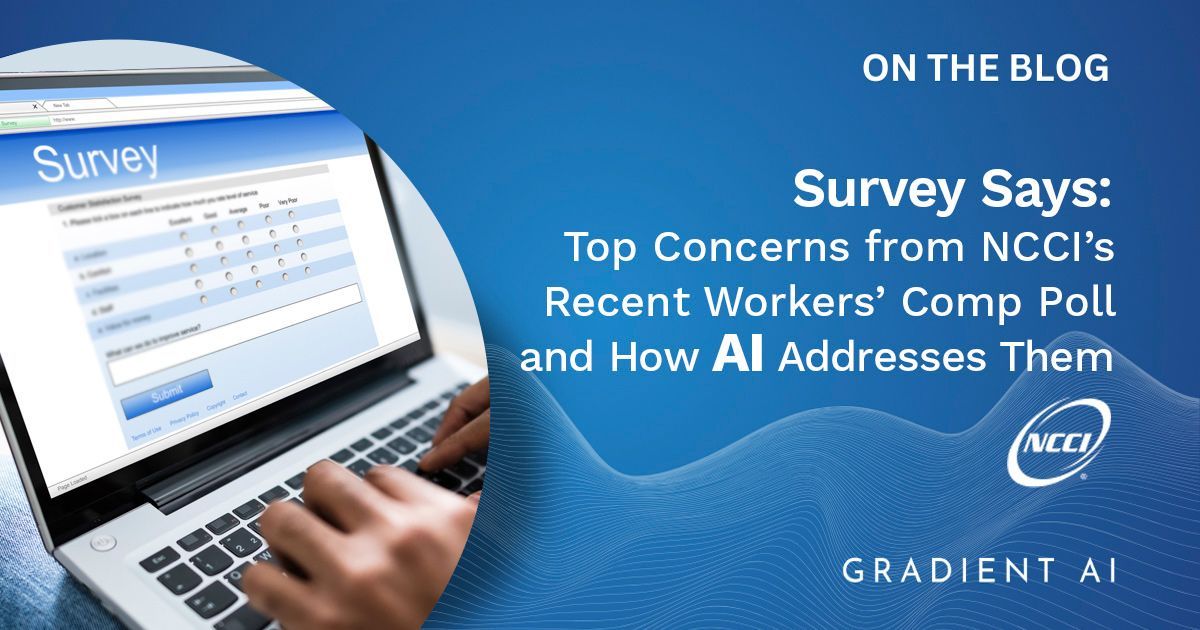Survey Says: Top Concerns from NCCI’s Most Recent Workers’ Comp Executive Poll and How AI Addresses Them
In the fast-paced world of workers' compensation insurance, staying ahead of the curve is paramount. That's why the findings from the National Council on Compensation Insurance’s (NCCI) latest survey are so crucial. NCCI, renowned for its comprehensive workers’ comp data and industry insights, recently polled insurance executives in its Annual Survey, to uncover the top concerns gripping the workers' comp market today.
Several key concerns came out of the survey, including challenges regarding rate adequacy, medical inflation, and the changing workplace and workforce. Here’s a glimpse into these three key challenges and how innovative AI solutions are reshaping the landscape:
1. Rate Adequacy
The NCCI survey found that insurers are concerned with the relentless decline in rates and loss costs. The looming question: Are traditional analysis methods robust enough to safeguard long-term financial stability? Many fear the uphill battle to maintain profitability in this evolving landscape.
How AI Addresses this Challenge
Workers’ Comp is a challenging market for all types of workers’ comp insurers, including primary and reinsurance carriers, MGAs, captives, and PEOs. Enter AI: a game-changer for underwriting operations. With AI, insurers can enhance their underwriting processes with access to sophisticated computer models and vast industry data lakes. AI supports insurers’ underwriting decisions with precision and profitability, enabling them to recognize risks that might otherwise have been missed, and price accordingly, or decline the business depending on strategic priorities.
Integrating AI into underwriting operations can help:
- Price policies more accurately and with deeper insights
- Enable straight through processing by identifying low-risk applications
- Accelerate expansion into new markets with a deeper understanding of risk
2. Medical Inflation
Escalating medical costs are sending shockwaves through the industry. Insurers are grappling with the uncertainty surrounding claim frequency and severity, exacerbated by inflationary pressures.
How AI Addresses this Challenge
AI to the rescue: By harnessing AI capabilities, underwriters and claims managers can unlock invaluable insights into potential claims, empowering them to make more informed decisions in an inflationary environment.
As an example of AI at work, a Third-Party Administrator (TPA) and Gradient AI customer, wanted to reduce the cost of claims and more quickly identify claims where targeted interventions could provide better outcomes for workers. The TPA determined that it needed a solution with the ability to:
· accurately identify high risk claims early – while there is still opportunity to improve their trajectory, and
· provide staff with an explanation of what is driving claim risk.
The TPA chose to integrate Gradient AI’s Risk Ranking solution into its claims operations, as it predicts which lost time or indemnity claims are most likely to exceed a high-cost threshold. This prediction can be delivered within a few days after a claim file is created and is automatically updated every time new data is added to the claim file. Equipped with this early warning, the TPA’s adjusters have the greatest opportunity to aggressively manage complex claims to reduce their severity and thereby help reduce cost.
3. The Changing Insurance Workplace and Workforce
The NCCI survey indicated insurers are also concerned about an evolving workforce that presents a new set of challenges – including telecommuters, gig workers, aging workers, young and/or less experienced workers, and an overall shortage of talent.
How AI Addresses this Challenge
AI is the bridge: Gradient AI found similar concerns discussed at a webinar we sponsored called How AI is Transforming the Insurance Industry and Bridging the Talent Gap, which presented key industry and labor trends and metrics, and the challenges insurers are facing to recruit and retain the talent needed for continued growth.
The panelists agreed that by harnessing AI, insurers can capture institutional knowledge and empower less experienced staff, ensuring operational efficiency and continuity. Specifically, it allows simpler claims to be sent to less experienced staff and processed quickly through expedited processes, while claims predicted to become more complex are promptly assigned to more seasoned adjusters. This approach frees up internal resources to focus on claims that need more attention at the time when it is needed most.
Conclusion: AI is the Linchpin for Workers’ Comp Insurers Seeking to Thrive in an Ever-Changing Landscape
Whether it's grappling with rate accuracy, claim cost containment, or navigating shifting workforce dynamics, the integration of AI into insurance operations isn't just a strategic move; it's a necessity for looking to future-proof their operations. By embracing AI-driven solutions, workers’ compensation insurers can unlock new insights into their claims and underwriting operations, enhance operational efficiency, and drive sustainable growth regardless of the challenges they face in this dynamic market.
Explore how Gradient’s AI-driven solutions can transform your workers’ compensation operations.
About the NCCI Survey
The 2023 Carrier Executive Survey includes responses from 101 executives representing 98 companies, including the largest multiline, multistate carriers: as well as many smaller, regional, and single-line workers compensation insurers. These survey results inform NCCI’s research and priorities going into 2024 to support the health of the system. To view the full summary of the NCCI Survey click here.


